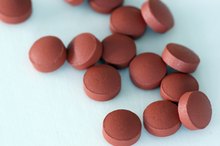Side Effects of Joint Care Supplements
Supplements commonly used for joint care include glucosamine, chondroitin (chondroitin sulfate) and methylsulfonylmethane (MSM). Although more research is needed, there is some evidence that these supplements can provide relief of joint pain. According to the Mayo Clinic, glucosamine may be taken regularly and well-tolerated for 30 to 90 days, chondroitin for up to three years and MSM up to 12 weeks. However, even within those guidelines, you may experience a number of side effects.
Gastrointestinal Side Effects
Glucosamine and chondroitin may both cause a number of gastrointestinal side effects, including nausea, loss of appetite, flatulence (gas), dyspepsia (indigestion/stomach upset), heartburn, diarrhea, constipation and vomiting. MSM is also associated with stomach upset and diarrhea.
Heart and Breathing Side Effects
Side Effects of Glucosamine Chondroitin & MSM Supplements
Learn More
Glucosamine and chondroitin may cause temporary increases in heart rate and blood pressure. They may also produce heart palpitations, chest pain, breathing difficulties, a feeling of tightness in the throat or chest, exacerbation of previously well-controlled asthma.
Blood Sugar Side Effects
There has been some debate over whether glucosamine (or glucosamine with chondroitin) supplements alter blood sugar levels. Blood sugar complications have been identified as a theoretical risk based on animal models; however, research with humans has shown mixed results. A study published in the December 2006 issue of “Journal of Family Practice” reports that glucosamine does not appear to adversely impact blood sugar control for those without diabetes or glucose intolerance, or for those whose diabetes is well-controlled. There is some evidence, however, that glucosamine can worsen glucose intolerance in people with untreated or undiagnosed diabetes. More research is needed to clarify these findings, but current recommendations are that those with diabetes or hypoglycemia should exercise caution when using glucosamine.
- There has been some debate over whether glucosamine (or glucosamine with chondroitin) supplements alter blood sugar levels.
- More research is needed to clarify these findings, but current recommendations are that those with diabetes or hypoglycemia should exercise caution when using glucosamine.
Rare Side Effects
Side Effects of Glucosamine on Blood Pressure
Learn More
A number of additional rare side effects have been reported or identified through scientific studies. MSM, glucosamine and chondroitin may all cause headache. Glucosamine and chondroitin may cause insomnia, hives, rash, photosensitivity (sun allergy) and drowsiness. Both supplements may also theoretically increase the risk of bleeding, so people with bleeding disorders or those taking drugs that can increase the risk of bleeding should exercise caution and consider modifying dosage.
Glucosamine may cause a toughening of the nails, and animal research indicates glucosamine theoretically may increase the risk for the development of cataracts in the eyes. Abnormal levels of protein in the urine have also been observed in several human cases, as has acute interstitial nephritis (swelling and dysfunction of the kidneys) and increased blood levels of creatine phosphokinase (an enzyme found in heart, brain and skeletal muscle). It is believed that impurities from some glucosamine products may cause some of these side effects.
Chondroitin may cause hair loss, swelling in the lower extremities, euphoria, motor uneasiness and eyelid edema (swelling). Animal research has shown it can cause bone marrow suppression. Chondroitin is also associated with the risk of increased spread or recurrence of prostate cancer, so those with prostate cancer who those who have had prostate cancer should not take chondroitin supplements.
- A number of additional rare side effects have been reported or identified through scientific studies.
- Glucosamine and chondroitin may cause insomnia, hives, rash, photosensitivity (sun allergy) and drowsiness.
Related Articles
References
- “Journal of Family Practice;” Clinical Inquiries: Do Glucosamine and Chondroitin Worsen Blood Sugar Control in Diabetes?; P.D. Marshall et al.; Dec. 2006
- Zhu X, Sang L, Wu D, Rong J, Jiang L. Effectiveness and safety of glucosamine and chondroitin for the treatment of osteoarthritis: a meta-analysis of randomized controlled trials. J Orthop Surg Res. 2018;13(1):170. doi: 10.1016/j.pcl.2011.10.018
- Palma dos reis R, Giacovelli G, Girolami F, André R, Bonazzi A, Rovati LC. Crystalline glucosamine sulfate in the treatment of osteoarthritis: evidence of long-term cardiovascular safety from clinical trials. Open Rheumatol J. 2011;5:69-77. doi: 10.2174/1874312901105010069
- Henrotin Y, Mathy M, Sanchez C, Lambert C. Chondroitin sulfate in the treatment of osteoarthritis: from in vitro studies to clinical recommendations. Ther Adv Musculoskelet Dis. 2010;2(6):335-48. doi: 10.1177/1759720X10383076
- Anderson JW1, Nicolosi RJ, Borzelleca JF. Glucosamine effects in humans: a review of effects on glucose metabolism, side effects, safety considerations and efficacy. Food Chem Toxicol. 2005 Feb;43(2):187-201.
- Black C1, Clar C, Henderson R, MacEachern C, McNamee P, Quayyum Z, Royle P, Thomas S. The clinical effectiveness of glucosamine and chondroitin supplements in slowing or arresting progression of osteoarthritis of the knee: a systematic review and economic evaluation. Health Technol Assess. 2009 Nov;13(52):1-148.
- Bruyere O, Reginster JY. Glucosamine and chondroitin sulfate as therapeutic agents for knee and hip osteoarthritis. Drugs Aging. 2007;24(7):573-80.
- Hathcock JN, Shao A. Risk assessment for glucosamine and chondroitin sulfate. Regul Toxicol Pharmacol. 2007 Feb;47(1):78-83. Epub 2006 Aug 30.
- National Institutes of Health. Chondroitin sulfate: MedlinePlus Supplements. February 2015.
- National Institutes of Health. Glucosamine sulfate: MedlinePlus Supplements. February 2015.
- Sawitzke AD, Shi H, Finco MF, et al. Clinical efficacy and safety of glucosamine, chondroitin sulphate, their combination, celecoxib or placebo taken to treat osteoarthritis of the knee: 2-year results from GAIT. Ann Rheum Dis. 2010 Aug;69(8):1459-64.
Writer Bio
Based in New York City, Tricia Mangan began her writing career in 2001. She has co-authored a National Cancer Institute report and a number of research articles that have appeared in medical journals. Tricia holds a Master of Arts in clinical psychology from Stony Brook University and boasts diverse clinical, research and teaching experience.









